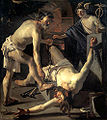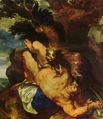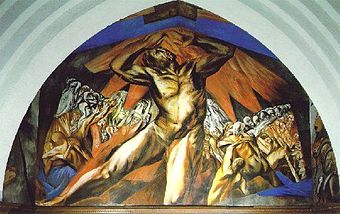- Prometheus
-
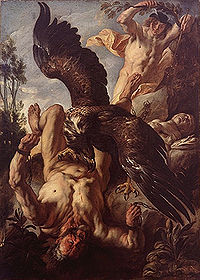 Prometheus having his liver eaten by an eagle. Painting by Jacob Jordaens, c. 1640, Wallraf-Richartz-Museum, Cologne, Germany.
Prometheus having his liver eaten by an eagle. Painting by Jacob Jordaens, c. 1640, Wallraf-Richartz-Museum, Cologne, Germany.
In Greek mythology, Prometheus (Greek Προμηθεύς, "forethought")[1] is a Titan, the son of Iapetus and Themis, and brother to Atlas, Epimetheus and Menoetius. He was a champion of mankind, known for his wily intelligence, who stole fire from Zeus and gave it to mortals.[2] Zeus then punished him for his crime by having him bound to a rock while a great eagle ate his liver every day only to have it grow back to be eaten again the next day. His myth has been treated by a number of ancient sources, in which Prometheus is credited with – or blamed for – playing a pivotal role in the early history of mankind. During the Greek War of Independence, Prometheus became a figure of hope and inspiration for Greek revolutionaries and their philhellene supporters.
Contents
Mythology
Greek deities
seriesTitans The Twelve Titans:
Oceanus and Tethys,
Hyperion and Theia,
Coeus and Phoebe,
Cronus and Rhea,
Mnemosyne, Themis,
Crius, Iapetus
Children of Oceanus:
Oceanids, Potamoi
Children of Hyperion:
Eos, Helios, Selene
Daughters of Coeus:
Leto and Asteria
Sons of Iapetus:
Atlas, Prometheus,
Epimetheus, Menoetius
Sons of Crius:
Astraeus, Pallas,
PersesHesiod
The Prometheus myth first appeared in the late 8th-century BC Greek epic poet Hesiod's Theogony (lines 507–616). He was a son of the Titan, Iapetus by Clymene, one of the Oceanids. He was brother to Menoetius, Atlas, and Epimetheus. In the Theogony, Hesiod introduces Prometheus as a lowly challenger to Zeus' omniscience and omnipotence. In the trick at Mecone, a sacrificial meal marking the "settling of accounts" between mortals and immortals, Prometheus played a trick against Zeus (545–557). He placed two sacrificial offerings before the Olympian: a selection of beef hidden inside an ox's stomach (nourishment hidden inside a displeasing exterior), and the bull's bones wrapped completely in "glistening fat" (something inedible hidden inside a pleasing exterior). Zeus chose the latter, setting a precedent for future sacrifices; henceforth, humans would keep the meat for themselves and burn the bones wrapped in fat as an offering to the gods. This angered Zeus, who hid fire from humans in retribution. Prometheus in turn stole fire in a giant fennel-stalk and gave it back to mankind. This further enraged Zeus, who sent Pandora, the first woman, to live with men.[3] She was fashioned by Hephaestus out of clay and brought to life by the four winds, with all the goddesses of Olympus assembled to adorn her. "From her is the race of women and female kind," Hesiod writes; "of her is the deadly race and tribe of women who live amongst mortal men to their great trouble, no helpmeets in hateful poverty, but only in wealth."
Prometheus, in eternal punishment, is chained to a rock in the Caucasus, where his liver is eaten daily by an eagle,[4] only to be regenerated by night, which, by legend, is due to his immortality.[5] Years later, the Greek hero Heracles (Hercules) slays the eagle and frees Prometheus from his chains.[6]
Hesiod revisits the story of Prometheus in the Works and Days (lines 42–105). Here, the poet expands upon Zeus' reaction to the theft of fire. Not only does Zeus withhold fire from men, but "the means of life," as well (42). Had Prometheus not provoked Zeus' wrath (44–47), "you would easily do work enough in a day to supply you for a full year even without working; soon would you put away your rudder over the smoke, and the fields worked by ox and sturdy mule would run to waste." Hesiod also expands upon the Theogony's story of the first woman, now explicitly called Pandora ("all gifts"). After Prometheus' theft of fire, Zeus sent Pandora in retaliation. Despite Prometheus' warning, Epimetheus accepted this "gift" from the gods. Pandora carried a jar with her, from which were released (91–92) "evils, harsh pain and troublesome diseases which give men death".[7] Pandora shut the lid of the jar too late to contain all the evil plights that escaped, but hope remained in the jar.
Angelo Casanova,[8] Professor of Greek Literature at the University of Florence, finds in Prometheus a reflection of an ancient, pre-Hesiodic trickster-figure, who served to account for the mixture of good and bad in human life, and whose fashioning of men from clay was an Eastern motif familiar in Enuma Elish; as an opponent of Zeus he was an analogue of the Titans, and like them was punished. As an advocate for humanity he gains semi-divine status at Athens, where the episode in Theogony in which he is liberated[9] is interpreted by Casanova as a post-Hesiodic interpolation.[10]
Aeschylus
Prometheus Bound, perhaps the most famous treatment of the myth to be found among the Greek tragedies, is traditionally attributed to the 5th-century BC Greek tragedian Aeschylus. At the center of the drama are the results of Prometheus' theft of fire and his current punishment by Zeus; the playwright's dependence on the Hesiodic source material is clear, though Prometheus Bound also includes a number of changes to the received tradition.[11] Before his theft of fire, Prometheus played a decisive role in the Titanomachy, securing victory for Zeus and the other Olympians. Zeus's torture of Prometheus thus becomes a particularly harsh betrayal. The scope and character of Prometheus' transgressions against Zeus are also widened. In addition to giving humankind fire, Prometheus claims to have taught them the arts of civilization, such as writing, mathematics, agriculture, medicine, and science. The Titan's greatest benefaction for humankind seems to have been saving them from complete destruction. In an apparent twist on the myth of the so-called Five Ages of Man found in Hesiod's Works and Days (wherein Cronus and, later, Zeus created and destroyed five successive races of mortal men), Prometheus asserts that Zeus had wanted to obliterate the human race, but that he somehow stopped him. Moreover, Aeschylus anachronistically and artificially injects Io, another victim of Zeus' violence and ancestor of Heracles, into Prometheus' story. Finally, just as Aeschylus gave Prometheus a key role in bringing Zeus to power, he also attributed to him secret knowledge that could lead to Zeus' downfall: Prometheus had been told by his mother Gaia of a potential marriage that would produce a son who would overthrow Zeus. Fragmentary evidence indicates that Heracles, as in Hesiod, frees the Titan in the trilogy's second play, Prometheus Unbound. It is apparently not until Prometheus reveals this secret of Zeus' potential downfall that the two reconcile in the final play, Prometheus the Fire-Bringer.
Prometheus Bound also includes two mythic innovations of omission. The first is the absence of Pandora's story in connection with Prometheus' own. Instead, Aeschylus includes this one oblique allusion to Pandora and her jar that contained Hope (252): "[Prometheus] caused blind hopes to live in the hearts of men." Second, Aeschylus makes no mention of the sacrifice-trick played against Zeus in the Theogony.[12]
These innovations reflect the play's thematic reversal of the Hesiodic myth. In Hesiod, the story of Prometheus (and, by extension, of Pandora) serves to reinforce the theodicy of Zeus: he is a wise and just ruler of the universe, while Prometheus is to blame for humanity's unenviable existence. In Prometheus Bound, this dynamic is transposed: Prometheus becomes the benefactor of humanity, while every character in the drama (except for Hermes, a virtual stand-in for Zeus) decries the Olympian as a cruel, vicious tyrant.
Other authors
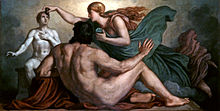 After fashioning a man out of clay, Prometheus watches Athena impart reason to his creation. Painting by Christian Griepenkerl, 1877
After fashioning a man out of clay, Prometheus watches Athena impart reason to his creation. Painting by Christian Griepenkerl, 1877
Some two dozen other Greek and Roman authors retold and further embellished the Prometheus myth into the 4th century AD. The most significant detail added to the myth found in, e.g., Sappho, Plato, Aesop and Ovid — was the central role of Prometheus in the creation of the human race. According to these sources, Prometheus fashioned humans out of clay. In the dialogue Protagoras, Protagoras asserts that the gods created humans and all the other animals, but it was left to Prometheus and his brother Epimetheus to give defining attributes to each. As no physical traits were left when the pair came to humans, Prometheus decided to give them fire and other civilizing arts.[13]
Although perhaps made explicit in the Prometheia, later authors such as Hyginus, Apollodorus, and Quintus of Smyrna would confirm that Prometheus warned Zeus not to marry the sea nymph Thetis. She is consequently married off to the mortal Peleus, and bears him a son greater than the father — Achilles, Greek hero of the Trojan War. Apollodorus moreover clarifies a cryptic statement (1026–29) made by Hermes in Prometheus Bound, identifying the centaur Chiron as the one who would take on Prometheus' suffering and die in his place.[13]
Reflecting a myth attested in Greek vase paintings from the Classical period, Apollodorus places the Titan (armed with an axe) at the birth of Athena, thus explaining how the goddess sprang forth from the forehead of Zeus.[13]
Other minor details attached to the myth include: the duration of Prometheus' torment;[14][15] the origin of the eagle that ate the Titan's liver (found in Apollodorus and Hyginus); Pandora's marriage to Epimetheus (found in Apollodorus); myths surrounding the life of Prometheus' son, Deucalion (found in Ovid and Apollonius of Rhodes); and Prometheus' marginal role in the myth of Jason and the Argonauts (found in Apollonius of Rhodes and Valerius Flaccus).[13]
Anecdotally, the Roman fabulist Phaedrus attributes to Aesop a simple etiology for homosexuality, in Prometheus' getting drunk while creating the first humans and misapplying the genitalia.[16]
Cults
- Prometheus had a small shrine in the Kerameikos, or potter's quarter, of Athens, not far from the Academy. The Academy had its own altar dedicated to Prometheus. According to the 2nd-century AD Greek traveler Pausanias, this site was central to a torch race dedicated to Prometheus.
- Pausanias also wrote that the Greek cities of Argos and Opous both claimed to be Prometheus' final resting place, each erecting a tomb in his honor.
- Finally, Pausanias attested that in the Greek city of Panopeus there was a cult statue claimed by some to depict Prometheus, for having created the human race there.[13]
Comparative myths
The two most prominent aspects of the Prometheus myth – the creation of man from clay and the theft of fire – have parallels within the beliefs of many cultures throughout the world:
The creation of man from clay
- In the Babylonian creation epic Enuma Elish, the goddess Ninhursag created humans from clay.
- In Africa, the Yoruba culture holds that the god Obatala likewise created the human race from clay.
- In Egyptian mythology, the ram-headed god Khnum made people from clay in the waters of the Nile.
- In Chinese myth, the goddess Nüwa created the first humans from mud and clay.
- According to Genesis 2:7 "And the Lord god formed man of the dust of the ground, and breathed into his nostrils the breath of life; and man became a living soul."
- According to Qur'an[23:12–15], Allah created man from clay.
- Mayan myth holds that Tepeu and Kukulkán (Quetzalcoatl) made the first humans from clay, but they were unsatisfactory.
- The Māori people believe that Tāne Mahuta, god of the forest, created the first woman out of clay and breathed life into her.
The theft of fire
- According to the Rig Veda (3:9.5), the hero Mātariśvan recovered fire, which had been hidden from mankind.
- In Cherokee myth, after Possum and Buzzard had failed to steal fire, Grandmother Spider used her web to sneak into the land of light. She stole fire, hiding it in a clay pot.[17]
- Among various Native American tribes of the Pacific Northwest and First Nations, fire was stolen and given to humans by Coyote, Beaver or Dog.[18]
- According to some Yukon First Nations people, Crow stole fire from a volcano in the middle of the water.[19]
- According to the Creek Native Americans, Rabbit stole fire from the Weasels.[20]
- In Algonquin myth, Rabbit stole fire from an old man and his two daughters.[21]
- In Ojibwa myth, Nanabozho the hare stole fire and gave it to humans.
- In Polynesian myth, Māui stole fire from the Mudhens.[22]
- In the Book of Enoch, the fallen angels and Azazel teach early mankind to use tools and fire.
Punishment
- In Norse mythology, the god Loki was bound to a rock. Above him is a large serpent which drips toxic venom upon him. His wife collects the poison in a bowl, but must empty it every time it gets full. As she is in the process of doing this, the snake proceeds to cover Loki in poison. Just as Prometheus gets his liver eaten only to have it grow back again, Loki is temporarily saved from venom only to have it drip on him once more.
- In Georgian mythology Amirani challenged the chief god and for that was chained on Caucasian mountains where birds would eat his organs.
In other arts
- The mythic Prometheus is the lyrical I of the poem "Prometheus" by Johann Wolfgang Goethe, in which the character addresses God (as Zeus) in misotheist accusation and defiance.
- The Norwegian symphonic black metal band Emperor released, in 2001, an album entitled "Prometheus: The Discipline of Fire & Demise".
- The American Metalcore band Trivium pointed out similarities of the crucifixion of Jesus Christ, and Prometheus's torment of being eternally tortured in their song "Of Prometheus and The Crucifix".
- Beethoven wrote a ballet called "The Creatures of Prometheus."
- "Prometheus Unbound" is a four-act play by Percy Bysshe Shelley first published in 1820.
- Prometheus: Poem of Fire, Opus 60 (1910) by Alexander Scriabin.
- Prometheus, Symphonic Poem No. 5 (S.99) by Franz Liszt.
- Prometheus, opera using Aeschylus's original Greek by Carl Orff, 1968.
- Prometheus On His Crag, a 1973 poetry collection by Ted Hughes.
- Prometheus' torment by the eagle and his rescue by Heracles were popular subjects in vase paintings of the 6th–4th c. BC. He also sometimes appears in depictions of Athena's birth from Zeus' forehead.
- There was a relief sculpture of Prometheus with Pandora on the base of Athena's cult statue in the Athenian Parthenon of the 5th century BC.
- Franz Kafka wrote a short piece on Prometheus (translated by Willa and Edwin Muir):
- There are four legends concerning Prometheus:
- According to the first, he was clamped to a rock in the Caucasus for betraying the secrets of the gods to men, and the gods sent eagles to feed on his liver, which was perpetually renewed.
- According to the second, Prometheus, goaded by the pain of the tearing beaks, pressed himself deeper and deeper into the rock until he became one with it.
- According to the third, his treachery was forgotten in the course of thousands of years, forgotten by the gods, the eagles, forgotten by himself.
- According to the fourth, everyone grew weary of the meaningless affair. The gods grew weary, the eagles grew weary, the wound closed wearily.
- There remains the inexplicable mass of rock. The legend tried to explain the inexplicable. As it came out of a substratum of truth it had in turn to end in the inexplicable.[23]
- A Soviet cartoon called Prometheus (Прометей) was created in 1974.[24]
- Laxmi Prasad Devkota, a great Nepalese poet, wrote an epic entitled Prometheus (प्रमीथस).
-
Prometheus by Gustave Moreau, (1868).
-
Prometheus Being Chained by Vulcan, by Dirck van Baburen, (1623).
-
Chained Prometheus, by Peter Paul Rubens, (1611–1612).
Prometheus, Pomona College, by José Clemente Orozco.
In modern culture
- The cloned horse Prometea, and Prometheus, a moon of Saturn, are named after this Titan, as is the asteroid 1809 Prometheus.
- The name of the sixty-first element, promethium, is derived from Prometheus.
 Prometheus and the vulture, modern sculpture by Jay Unwin (1995), Royal Roads University Victoria, British Columbia
Prometheus and the vulture, modern sculpture by Jay Unwin (1995), Royal Roads University Victoria, British Columbia
The story of Prometheus has inspired many authors through the ages, and the Romantics saw Prometheus as a prototype of the natural daemon or genius.
- The Prometheus Society is a High IQ society. Its magazine is called 'Gift of Fire' and its website [1] notes that fire has from antiquity been associated with mental gifts.
- Mary Shelley's 1818 novel Frankenstein is subtitled "The Modern Prometheus". This is a reference to the novel's themes of the over-reaching of modern man into dangerous areas of knowledge.
- Percy Bysshe Shelley's Prometheus Unbound rewrites the lost play of Aeschylus so that Prometheus does not submit to Zeus (Shelley's Jupiter), but supplants him instead in a triumph of the human heart and intellect over tyrannical religion. Lord Byron's poem "Prometheus" also portrays the Titan as unrepentant. For the Romantics, Prometheus was the rebel who resisted all forms of institutional tyranny epitomized by Zeus — church, monarch, and patriarch. They drew comparisons between Prometheus and the spirit of the French Revolution, Christ, Milton's Satan, and the divinely inspired poet or artist.
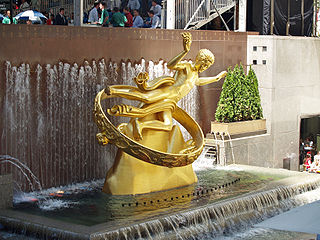 Sculpture of Prometheus in front of the GE Building at the Rockefeller Center (New York City, New York, United States).
Sculpture of Prometheus in front of the GE Building at the Rockefeller Center (New York City, New York, United States).
- Prometheus Books, a publishing company for scientific, educational, and popular books, especially those relating to secular humanism or scientific skepticism, takes its name from the myth.
- The Prometheus Award is given by the Libertarian Futurist Society for Libertarian science fiction."
- Ayn Rand uses Prometheus (as well as other characters from Greek mythology) as metaphors of her individualist ideology in Atlas Shrugged and Anthem.
- Alexander Scriabin's seminal orchestra piece, Prometheus: Poem of Fire, is named after the mythological figure.
- In the novel The Last Olympian (the final book in the Percy Jackson and the Olympians series), Prometheus appears as an ally of the Titans. He explains this change of alliance by stating that he has foreseen that the Titans will win this time, and it is suggested that all of his supposed good deeds were actually done for his own ends, portraying Prometheus as a sort of conman.
- Prometheus is a character in Jasper Fforde's The Big Over Easy.[25]
Liver regeneration
Scientific and medical works about liver regeneration often refer to Prometheus who was chained to a rock in the Caucasus where, each day, his liver was devoured by an eagle only to grow back each night. Some think the myth indicates that the ancient Greeks knew about the liver’s remarkable capacity for self-repair, since the etymology of ἧπαρ (Greek for liver) is derived from ἠπάομαι, meaning mend, repair.[26] This claim has been challenged.[27] Because of the association of Prometheus with liver regeneration, his name has also been associated with biomedical companies involved in regenerative medicine.
See also
- Amirani, a name of a culture hero of a Georgian Epic who resembles the Classical Prometheus.
- Prometheism, a political project in Poland named for Prometheus.
- Prometheus the Fire-Bringer or Prometheus Pyrphoros, a lost tragedy by Aeschylus.
Notes
- ^ The Greek derivation of Prometheus from the Greek pro (before) + manthano (learn), thus "forethought", which engendered a contrasting brother Epimetheus, has been disputed by some linguists; it is succinctly expressed in Servius' commentary on Virgil, Eclogue 6.42: "Prometheus vir prudentissimus fuit, unde etiam Prometheus dictus est ἀπὸ τής πρόμηθείας, id est a providentia." Some linguists believe, however, that the name comes from the Proto-Indo-European root that also produces the Vedic pra math, "to steal," hence pramathyu-s, "thief", whence "Prometheus", the thief of fire. The Vedic myth of fire's theft by Mātariśvan is an analog to the account found in Greek myth. To these etymological cognates, we may add pramantha, the tool used to create fire. Thus Fortson 2004, 27; Williamson 2004, 214–15; Dougherty 2006, 4.
- ^ There is scholarly thought that man already had fire, and it was taken away by Zeus. Cf. M.L. West commentaries on Hesiod, W.J. Verdenius commentaries on Hesiod, and R. Lamberton's Hesiod, pp.95–100.
- ^ Hesiod, Theogony 590-93.
- ^ The Aetos Kaukasios (or Caucasian Eagle) in the Prometheus Myth
- ^ The liver is one of the rare human organs to regenerate itself spontaneously in the case of lesion.
- ^ Hesiod, Theogony
- ^ Hesiod, WORKS AND DAYS Translation By H. G. Evelyn-White
- ^ Casanova, La famiglia di Pandora: analisi filologica dei miti di Pandora e Prometeo nella tradizione esiodea (Florence) 1979.
- ^ Hesiod, Theogony, 526-33.
- ^ In this Casanova is joined by some editors of Theogony.
- ^ Some of these changes are rather minor. For instance, rather than being the son of Iapetus and Clymene Prometheus becomes the son of Gaea. In addition, the chorus makes a passing reference (561) to Prometheus' wife Hesione, whereas a fragment from Hesiod's Catalogue of Women calls her by the name of Pronoia. (Theoi Project: Pronoia).
- ^ Aeschylus, Prometheus Bound
- ^ a b c d e Theoi Project: "Prometheus:
- ^ 30 Years
- ^ 30,000 Years
- ^ Dionysos
- ^ Erdoes/Ortiz 1984.
- ^ Judson 1912.
- ^ Janke, Daniel (2008). "How People Got Fire (animated short)" (DVD). National Film Board of Canada. http://onf-nfb.gc.ca/eng/collection/film/?id=57017. Retrieved 2010-02-10.
- ^ Swanton 1929.
- ^ Alexander 1916.
- ^ Westervelt 1910, Ch. 5.
- ^ Glatzer, Nahum N., ed. "Franz Kafka: The Complete Stories" Schocken Book, Inc.: New York, 1971.
- ^ http://www.animator.ru/db/?ver=eng&p=show_film&fid=2661
- ^ Review:THE BIG OVER EASY: A Nursery Crime
- ^ LSJ entry ἠπάομαι meaning mend, repair
- ^ An argument for the ancient Greek’s knowing about liver regeneration is provided by Chen T and Chen P (1994). "The Myth of Prometheus and the Liver". Journal of the Royal Society of Medicine 87(12): 754-755. A counterargument is provided by Power C and Rasko J (2008). "Whither Prometheus' Liver? Greek Myth and the Science of Regeneration". Annals of Internal Medicine 149(6): 421-426.
References
- Alexander, Hartley Burr. The Mythology of All Races. Vol 10: North American. Boston, 1916.
- Beall, E.F., Hesiod's Prometheus and Development in Myth, Journal of the History of Ideas, Vol. 52, No. 3 (Jul. – Sep., 1991), pp. 355–371
- Dougherty, Carol. Prometheus. Taylor & Francis, 2006. ISBN 0415324068, 9780415324069
- Erdoes, Richard and Alfonso Ortiz, edds. American Indian Myths and Legends. New York, 1984.
- Fortson, Benjamin. Indo-European Language and Culture: An Introduction. Blackwell Publishing, 2004.
- Judson, Katharine B. Myths and Legends of the Pacific Northwest. Chicago, 1912.
- Lamberton, Robert. Hesiod, Yale University Press, 1988. ISBN 0300040687
- Swanton, John. "Myths and Tales of the Southeastern Indians." Bureau of American Ethnology Bulletin 88: 1929.
- Verdenius, Willem Jacob, "A Commentary on Hesiod: Works and Days, Vv. 1–382", Brill, 1985, ISBN 9004074651
- West, M.L., "Hesiod, Theogony, ed. with prolegomena and commentary", Oxford: Clarendon Press 1966
- West, M.L., "Hesiod, Works and Days, ed. with prolegomena and commentary", Oxford: Clarendon Press 1978
- Westervelt, W.D. Legends of Maui – a Demigod of Polynesia, and of His Mother Hina. Honolulu, 1910.
- Williamson, George S. The Longing for Myth in Germany: Religion and Aesthetic Culture from Romanticism to Nietzsche (Chicago, 2004).
Further reading
- Fernandes, Ângela, "Human values and spiritual values: Traces of Prometheus in Portuguese literature and criticism", in journal Neohelicon, Akadémiai Kiadó, co-published with Springer Science+Business Media B.V., Volume 34, Number 1 / June, 2007, pp. 41–49
- Kerényi, Carl, (Translated by Ralph Manheim) "Prometheus: Archetypal Image of Human Existence", Princeton University Press, 1997. ISBN 069101907X
External links
- Theoi Text, Theogony
- Theoi Text, Works and Days
- Theoi Text, Prometheus Bound
- Theoi Mythology, Prometheus
- Theoi Mythology, Pronoea
- GML, Prometheus
- Messagenet, Prometheus
- Prometheus, a poem by Noevel (French)
- Prometheus, a poem by Byron
- Book "Prometheus Bound" (for free download – two volumes about 600 pages)
- O fogo e as chamas dos mitos (text in Portuguese) by Betty Mindlin (Essay about the origin of fire, the stealing of fire, the keeping of fire in different South-American indigenous cultures).
Greek mythology (deities) Primordial
deitiesMoirai (Fates)Titan
deitiesTitanesTitanidesHyperionidesKoionidesKrionidesIapetionides- Atlas
- Prometheus
- Epimetheus
- Menoetius
Olympian
deitiesDodekatheonTheoi OlympioiMousai (Muses)Charites (Graces)- Aglaea
- Euphrosyne
- Thalia
Horae (Hours)StyktidesOceanic
deitiesTheoi HalioiChthonic
deitiesTheoi KhthonioiErinyes (Furies)Earthborn- Hecatonchires
- Cyclopes
- Gigantes
- Kouretes
- Meliae
- Telkhines
- Typhon
Apotheothenai- Iacchus
- Trophonius
- Triptolemus
- Orpheus
- Minos
- Aeacus
- Rhadamanthys
Categories:- Greek deities
- Greek mythology
- Titans
- Primordial teachers
- Wisdom gods
- Creator gods
- Greek mythological hero cult
- Greek culture heroes
- Monomyths
Wikimedia Foundation. 2010.




